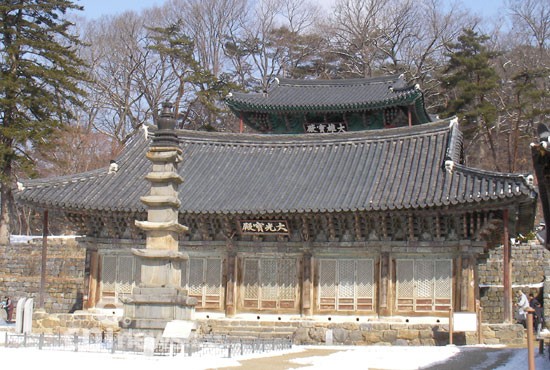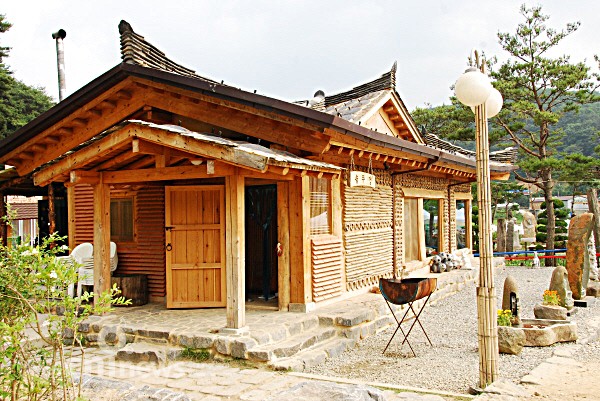About Chungnam
News
Temple stay at Magok Buddhist Temple, Gongju
A journey to find myself
2009.08.20(목) | CNnews (![]() chungnamdo@korea.kr)
chungnamdo@korea.kr)
 |
||
Once they changed into the gray priest clothes and white rubber shoes, their special journey of one night and two days at the temple began. They wondered how their two days at the place would turn out. Looking at their faces and eyes, it was apparent that they were nervous listening to each of the priest's words about the schedule.
Meditation-the shortcut to one's mind
Everything was new to them at the temple from calling the female and male participants Bosal and Cheosa, respectively, to showing courtesy to others with their hands pressed in prayer. They felt even more awkward with the unfamiliar gestures. Despite their uneasiness, their life at the temple began.
The time for ‘meditations’ is particularly much in the temple stay program. They say meditation is the best shortcut to realizing one's mind and the practice most valued in Buddhism.
The first segment of the program at the Yeonhwadang was none other than the meditation hour for them to repeat ‘I am a happy person.’ After the priest said that it's the time for them to look at themselves positively and find the real ego, they started their meditation. ‘Finding myself’ is not to look for myself because I am not there but to understand who I really am. The scheduled two hours didn't seem two long by their estimation. But sitting still and trying to look back on themselves was not as easy as they expected. Soon they felt their legs were numb and a pain in their lower backs...The entire body that had been so busy out in the world was now screaming aloud as if it were fighting back.
As time went by, however, they felt little changes to both their bodies and minds. Finally, they realized that they had so much with them and were happy people after all. The two hours was such an amazing experience for them to make a discovery about themselves.
Learning about the world for all
 |
||
Supper happened by the stream within the temple perimeter with the participants sitting in a circle. Modern people are too much accustomed to being alone; they eat alone with their individual containers, which pattern may have caused them to focus on themselves and ignore the togetherness of the community. Understanding that, the participants decided to put their rice and side dishes in a large bowl and have bibimbap. The occasion was called ‘tebalu’ meaning offering food to Buddha together and originated from the priests' begging around in the past. They would gather the food obtained from begging in a large bowl and share them with each other, realizing the equality in food. Those foods from the rich families and those from the poor families were mixed together.
The evening came upon early at the temple in the mountain. Without light, one couldn't even see the front of one's nose. The participants were heading somewhere with a piece of cloth in their hands. The destination was the stepping stones across the stream. They were told to pair up; one of the pair was supposed to cover their eyes with the cloth, and the other to lead the partner throughout the stepping stones. During the activity, they realized they would be able to make it in the dark world once they were with others. Then they started to think about the faces of their parents, wives, children, and friends.
The temple makes me humble.
The participants were tossing and turning with the sound that the wind bells and winds made. Suddenly they were awakened by a sound that would wake up all the creatures in the world. The sound resonated in the ground and sky and in their minds. It's the sound of the Buddhist drum starting to ring at three in the morning, when a day begins at the temple. Not having a sound sleep, the participants felt heavy with their bodies and moods. But they finally forgot about the discomforts altogether listening to the drum playing for a while.
After the dawn prayer, there came the time for making 108 bows, which is a good practice to do every morning in order to control all the agonies in mind. The number 108 comes from the same number, representing the number of agonies that people have in the secular world. Making bows, one is supposed to empty his mind and lower his body in a humble manner.
The participants made the first bow, the second, the third...With each bow, their breath was growing heavier and their bodies felt hotter. Soon their clothes were soaked in sweat; both of their legs felt a ton pressing the body down. Then there is a saying, “Time flies even when you're hanging upside down.” Finally the last of 108 bows came after it had seemed so far away.
Back to the secular world, they would start their ordinary life before. It's a person's destiny to have desire, to feel sorry, and to want something. But they felt they were different persons from yesterday as they were walking down the mountain. Their minds felt different from yesterday.
Walking down the mountain, they saw the trees and plants, which seemed different to them. The leaves felt more red and yellow than yesterday. They continued their returning trip down to the world with the beautifully colored mountain left behind. That autumn day would stay in their minds for a very long time.




